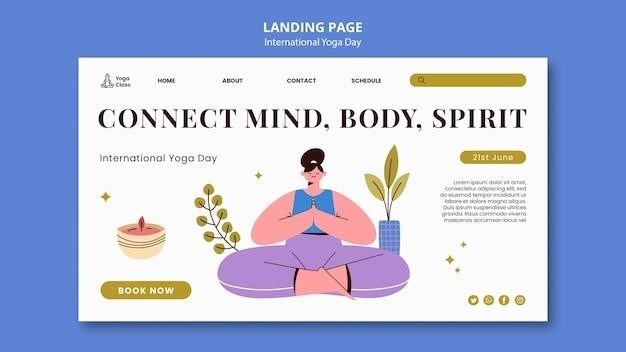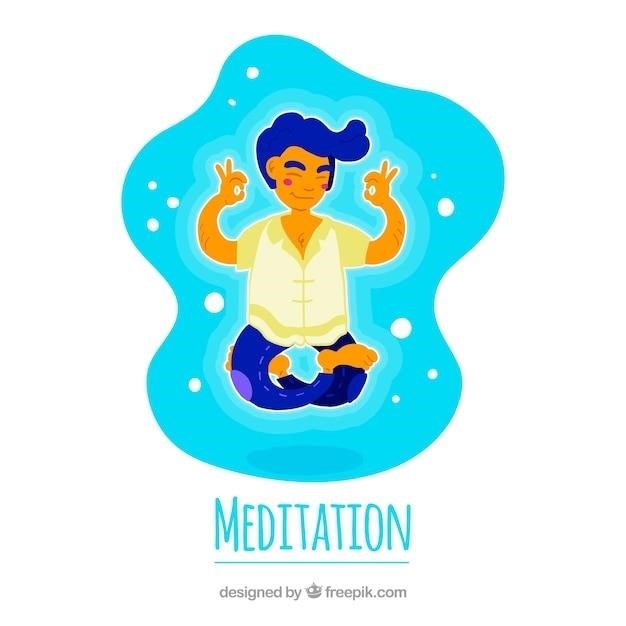Eastern Body, Western Mind⁚ A Synthesis of East and West
Anodea Judith’s groundbreaking work integrates Eastern chakra systems with Western psychology, creating a unique framework for self-understanding and personal growth․ It bridges science, spirituality, and philosophy․
Anodea Judith’s Groundbreaking Approach
Anodea Judith’s “Eastern Body, Western Mind” offers a revolutionary approach to understanding the chakra system․ She masterfully blends the ancient Eastern wisdom of chakras with the established principles of Western psychology, including Jungian psychology and somatic therapy․ This innovative synthesis provides a practical framework for self-discovery and personal development, making complex concepts accessible to a Western audience․ Judith’s approach goes beyond a simple explanation of chakras; it provides a detailed exploration of how these energy centers relate to our psychological, emotional, and physical well-being, offering a holistic perspective on human experience․ The book’s unique strength lies in its ability to seamlessly integrate seemingly disparate fields of knowledge, creating a cohesive and insightful understanding of the human condition․ Her work has significantly influenced modern holistic practices and continues to resonate with readers seeking a deeper understanding of themselves․
Merging Eastern Chakra System with Western Psychology
Anodea Judith’s “Eastern Body, Western Mind” ingeniously bridges the gap between the Eastern chakra system and Western psychological frameworks․ The book doesn’t simply present the chakras as an esoteric concept; instead, it meticulously connects them to established Western psychological theories, making the system relevant and understandable to a Western audience․ Judith skillfully integrates concepts from Jungian psychology, providing insightful analyses of archetypes and shadow work within the context of the chakra system․ The integration of somatic therapy further grounds the energetic aspects of the chakras in the physical body, creating a holistic and comprehensive understanding․ This innovative approach is not merely an academic exercise; it provides practical tools and techniques for self-exploration and personal growth, enabling readers to utilize the chakra system for self-healing and transformation․ This unique blend empowers individuals to address psychological challenges through a lens informed by both Eastern and Western perspectives․
Jungian Psychology and Somatic Therapy Integration
Anodea Judith masterfully weaves together Jungian psychology and somatic therapy within the framework of the chakra system․ The book explores the archetypal energies associated with each chakra, illuminating how these energies manifest in our conscious and unconscious lives, mirroring Jung’s concepts of the shadow self and the collective unconscious․ This integration isn’t superficial; it provides a profound understanding of how unresolved psychological issues can manifest as energetic blockages within the chakra system․ Furthermore, the incorporation of somatic therapy emphasizes the body’s role in emotional processing․ The book emphasizes the interconnectedness of mind, body, and spirit, suggesting that healing requires addressing both the psychological and physical aspects of trauma and imbalance․ Through this synthesis, readers gain a powerful toolkit for self-discovery and healing, integrating insights from both Western therapeutic modalities and the ancient wisdom of the Eastern chakra system․ This unique combination makes the book exceptionally valuable for those seeking a deeper understanding of themselves and their relationship to the world․
Key Themes Explored in the Book
Judith’s book delves into childhood development’s impact on chakra energy and explores personal empowerment through understanding these energetic centers․
Childhood Development and the Chakras
Anodea Judith’s “Eastern Body, Western Mind” offers a compelling exploration of how early childhood experiences significantly shape the development and balance of our chakra system․ The book posits that unresolved traumas, unmet needs, and ingrained patterns from childhood can manifest as imbalances within specific chakras, leading to various physical, emotional, and psychological challenges in adulthood․ By understanding this connection, individuals can gain valuable insight into the root causes of their current struggles․ Judith expertly weaves together psychological concepts with the energetic framework of the chakras, providing readers with a comprehensive understanding of how their past influences their present well-being․ This approach encourages self-reflection and empowers readers to address underlying issues, fostering personal growth and healing․ The detailed exploration of each chakra’s developmental stage provides practical tools for self-discovery and transformation․ This insightful perspective offers a path towards greater self-awareness and healing․
Social Issues and Personal Empowerment
Anodea Judith’s “Eastern Body, Western Mind” extends beyond individual psychology, addressing how societal structures and cultural norms impact our energy systems․ The book examines the influence of social conditioning on chakra development, highlighting how societal pressures, expectations, and ingrained biases can lead to imbalances and blockages․ Judith explores the connections between societal issues such as addiction, codependency, and family dynamics, and their manifestation within the chakra system․ This analysis provides a deeper understanding of how personal experiences intersect with broader social contexts․ By recognizing these influences, readers can begin to challenge limiting beliefs and societal conditioning, fostering personal empowerment and creating positive change in their lives and communities․ The text empowers readers to reclaim their energy and build resilience against societal pressures, promoting self-acceptance and fostering a stronger sense of self․

Practical Applications and Relevance
This book offers practical tools for self-discovery and personal growth, helping readers understand their strengths and weaknesses through the lens of the chakra system․ It provides a path towards self-empowerment․
Understanding Personal Strengths and Weaknesses
Eastern Body, Western Mind provides a unique lens through which to examine personal strengths and weaknesses․ By understanding the seven chakra energy centers and their corresponding psychological and physical manifestations, individuals can gain valuable insights into their inherent capabilities and limitations․ The book’s framework allows for a deeper understanding of how imbalances in certain chakras might manifest as specific personality traits or recurring patterns of behavior․ For example, a blocked root chakra may lead to feelings of insecurity and instability, while an overactive solar plexus chakra could manifest as controlling behavior․ By identifying these imbalances, readers can begin to address underlying issues and cultivate a more balanced and integrated sense of self․ This self-awareness is a crucial first step towards personal growth and transformation, enabling individuals to harness their strengths and mitigate the impact of their weaknesses․
Addressing Addiction and Codependency
Anodea Judith’s “Eastern Body, Western Mind” offers a unique perspective on addiction and codependency, framing them within the context of the chakra system․ The book explores how imbalances in specific energy centers can contribute to addictive behaviors and codependent relationships․ For instance, it suggests that root chakra instability might manifest as a reliance on external substances for security, while a suppressed sacral chakra could lead to suppressed emotions and unhealthy attachments․ By understanding the energetic underpinnings of these issues, readers can gain valuable insights into their own patterns and develop more effective strategies for healing․ The text emphasizes the importance of cultivating self-awareness and addressing underlying emotional wounds․ It suggests techniques for restoring balance to the chakras, fostering self-empowerment, and breaking free from unhealthy dependencies․ This approach offers a holistic perspective that complements traditional therapeutic methods․

The Book’s Impact and Reception
“Eastern Body, Western Mind” garnered critical acclaim and widespread popularity, significantly influencing modern holistic practices and self-help approaches․
Critical Acclaim and Popular Appeal
Anodea Judith’s “Eastern Body, Western Mind” has achieved remarkable success, garnering significant praise from critics and readers alike․ Its innovative approach to integrating Eastern spiritual concepts with Western psychological frameworks resonated deeply with a wide audience․ The book’s clear and accessible writing style, combined with its insightful exploration of personal growth and self-discovery, contributed to its widespread popularity․ Many reviewers lauded its ability to bridge the gap between seemingly disparate fields, making complex ideas readily understandable to a broader readership․ The book’s enduring appeal is evident in its continued presence in bookstores and online platforms, testament to its lasting impact on the field of holistic well-being․ Its practical applications and relatable case studies have made it a valuable resource for individuals seeking a deeper understanding of themselves and their place in the world․ The book’s success speaks volumes about the growing interest in integrating mind, body, and spirit approaches to wellness․
Influence on Modern Holistic Practices
Anodea Judith’s “Eastern Body, Western Mind” has profoundly influenced the landscape of modern holistic practices․ Its insightful integration of Eastern chakra systems with Western psychological models has become a cornerstone of many therapeutic approaches․ The book’s impact extends beyond individual self-help; it has shaped the curricula of numerous holistic health programs, informing the training of therapists, counselors, and wellness practitioners․ Its emphasis on the interconnectedness of mind, body, and spirit has encouraged a more comprehensive approach to healing and personal growth․ The book’s accessibility has empowered individuals to take ownership of their well-being, promoting self-awareness and self-empowerment․ Its influence can be observed in the growing popularity of holistic therapies that incorporate energy work and psychological insights, reflecting a broader cultural shift towards integrated approaches to health and wellness․ The book’s legacy continues to inspire innovative methods in holistic healthcare․
